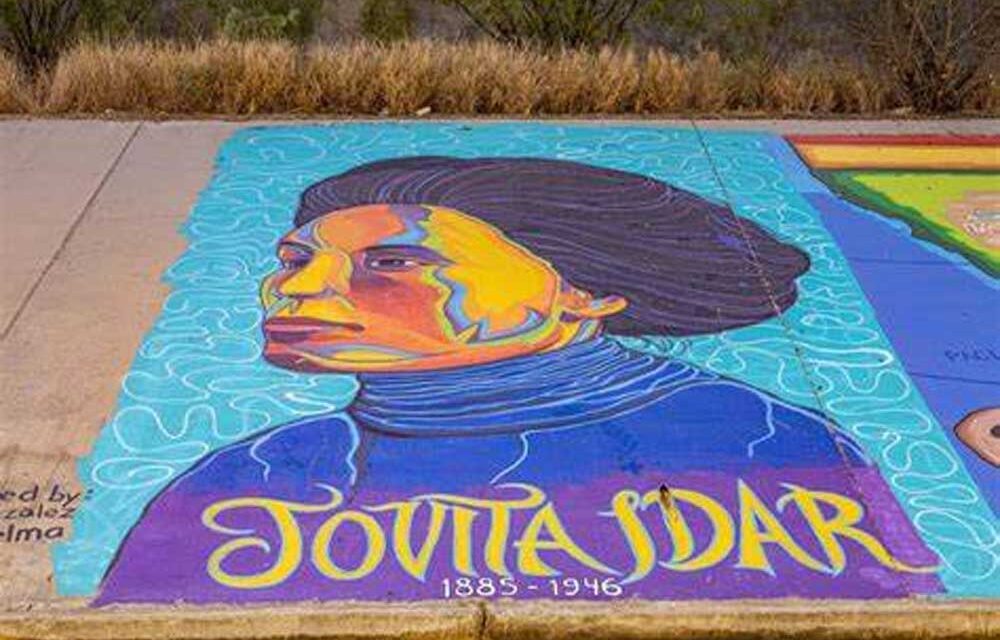Jovita Idar is a very important historical personage who is a fellow Laredoan and very much a part of Laredo, Nuevo Laredo, and South Texas history.
The first honor for Jovita Idár came in 2014 when the Texas Historical Commission approved a historical marker that was placed at St. Peter’s Plaza in Laredo, Texas. The historical marker is located at the corner of Matamoros Street and Main Avenue.
Before I proceed with the other accolades that have been bestowed upon Jovita Idár, I would like to share with you her biography that was written by Nancy Baker Jones and published by the Handbook of Texas.
“IDÁR, JOVITA (1885–1946).Jovita Idár, teacher, journalist, and political activist, was born in Laredo in 1885, one of eight children of Jovita and Nicasio Idár. She attended the Holding Institute (a Methodist school) in Laredo, from which she earned a teaching certificate in 1903. She then taught at a small school in Ojuelos. Inadequate equipment and poor conditions, as well as her inability to improve them, frustrated her, so she resigned and joined two of her brothers as writers for her father’s weekly newspaper, La Crónica.
In 1910 and 1911 La Crónica was vocal in criticizing certain aspects of Hispanic-Anglo relations. It featured stories on educational and social discrimination against Mexican-Americans, deteriorating economic conditions, decreasing use of the Spanish language, the loss of Mexican culture, and lynchings of Hispanics. The newspaper also supported efforts of the revolutionary forces in Mexico. In 1911 La Crónica called a convention of the Orden Caballeros de Honor, a fraternal order, to discuss the troubling issues of the times. In September 1911 Jovita Idár joined lodge members and others at Laredo in the First Mexican Congress to discuss educational, social, labor, and economic matters. Women participated as speakers and participants; for some it was the first political meeting. This congress has been called the first attempt in Mexican-American history to organize a militant feminist social movement. That same year, Idár published a pro-woman suffrage piece in La Crónica. In 1916, when she and her brother, Eduardo, formed another newspaper entitled Evolución, they continued to advocate publicly through their press the importance of women’s rights in politics. Another outcome of the congress was the formation in October 1911 of La Liga Femenil Mexicanista. Jovita Idár became its first president and organized its principal effort, to provide education for poor children.
In 1913 during the Mexican Revolution battle of Nuevo Laredo, Idár and a friend, Leonor Villegas de Magnón, crossed the border to care for the injured. Idár later joined La Cruz Blanca, a medical group similar to the Red Cross, and traveled in northern Mexico with revolutionary forces as a nurse. When she returned to Laredo later that year she joined the staff of the newspaper El Progreso and soon offended the United States Army and Texas Rangers with an editorial protesting President Woodrow Wilson’s dispatch of United States troops to the border. When rangers arrived to close down El Progreso, Idár stood in the doorway to keep them from entering. The rangers closed the newspaper later, however, and Idár returned to La Crónica. After her father died in 1914, she ran the paper.
In 1917 Idár married Bartolo Juárez. The couple moved to San Antonio, where Jovita Juárez became an active member of the Democratic Party, established a free kindergarten, worked as an interpreter for Spanish-speaking patients in a county hospital, and was an editor of El Heraldo Cristiano, a publication of the Rio Grande Conference of the Methodist Church. She and her husband had no children. She died in San Antonio in 1946.”
According to the Death Certificate, Jovita Idár Juárez lived in the West Side of San Antonio, which was predominately Mexican and Mexican American, at 209 Pérez Street, Apartment 4. She passed away on Thursday, June 13, 1946, at 12:15 P.M., from far advanced Pulmonary Tuberculosis. She was 60 years old. The contributing cause of death was a Massive Pulmonary Hemorrhage. Funeral services were under the care of Alamo Funeral Home. I would like to add that Jovita Idár Juárez is buried in the San José Burial Park in Southeast San Antonio.
In October 2020, the City of Laredo announced the opening of the new Jovita Idár “El Progreso” Park, located at 6002 Thomas Avenue.
Along with the opening ceremonies of naming the new park, the City of Laredo also unveiled a mural of Jovita Idár that is located inside the park, along one of the trails. The mural was painted by Abel González, an artist from Laredo.
And the last honor and greatest tribute to Jovita Idár occurred on August 29, 2022, when the United States Mint announced that she would be included in the American Women Quarter Program for 2023.
Indeed, Jovita Idár was a remarkable woman and deserves all these great honors and recognition for dedicating her life for the advancement and improvement of her fellow human beings. And I am very proud of the City of Laredo for recognizing and advocating her long overdue recognition and homage.






